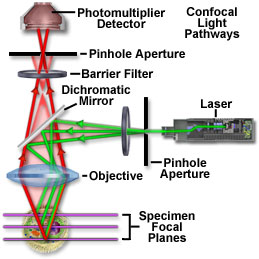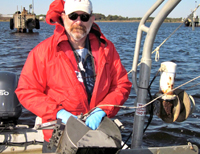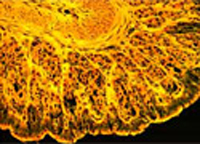Parsons grant will enhance several research programs at VIMS
The Mary Morton Parsons Foundation has provided the Virginia Institute of Marine Science Foundation with a leadership grant of $400,000 that VIMS researchers will use to purchase a state-of-the-art “confocal” microscope—a laser microscope capable of generating high-resolution 3-D images.
The confocal microscope will aid scientists in several research areas—including studies of harmful algal blooms, nitrogen pollution, crustacean immunity, and shellfish disease—all of which involve graduate students in William & Mary’s School of Marine Science at VIMS.
Founded in 1988 as a private foundation to support the capital needs of other non-profit organizations, the Mary Morton Parsons Foundation in Richmond, Virginia, has awarded approximately $73 million to qualified grantees to date.
Parsons Foundation Board President Thurston R. Moore says “The Foundation acknowledges the unique role VIMS plays in providing the advanced science necessary to preserve the resources we all love and cherish, particularly Chesapeake Bay. We’re happy to support the important work being done at VIMS.”
VIMS Dean and Director John Wells says “Everyone at VIMS—faculty, staff, and students—greatly appreciates the Parsons Foundation’s gift. Its generous support helps us advance our mission of research, education, and advisory service to the Commonwealth and the nation.”
VIMS professors Kimberly Reece and Wolfgang Vogelbein—along with one of their graduate students—will use the confocal microscope to help monitor local waters and shellfish-growing areas for the presence of harmful algal blooms (HABs), or “red tides,” which have been increasing in Virginia with the expansion of new, potentially toxic species.
Reece says the new microscope will allow her to observe directly the interactions between HAB cells and animals such as oysters, crabs, and finfish. She and Vogelbein will gain a deeper understanding of the potential adverse health impacts of these algal blooms and will develop mitigation approaches for Chesapeake Bay.

New faculty member B.K. Song—who studies the role of microorganisms in the global nitrogen cycle—will use the confocal microscope to better understand the structure and function of microbial communities, which will assist in efforts to keep nitrogen in wastewater from entering coastal waters. Excess nitrogen input leads to rampant algal growth and consequent low-oxygen conditions in Chesapeake Bay and its tributaries.
VIMS professor Jeffrey Shields and Assistant Research Scientist Hamish Small will use the new instrument to visualize more accurately the immune mechanisms in crabs and lobsters—crustaceans that support one of the most economically valuable fisheries in Virginia and the U.S.—and thus will gain new insights into how crustaceans fend off existing and emerging diseases.
Professor Ryan Carnegie—director of the VIMS Shellfish Pathology Laboratory—says he plans to use the microscope as a platform for research into parasite life cycles and the interactions among marine pathogens and their shellfish hosts.
“It will provide capabilities that far exceed existing microscopy resources,” says Carnegie. “Student interest in marine diseases is high, and the microscope will be a centerpiece of graduate education efforts in this area.”
W&M President Taylor Reveley says “The College is very grateful for the Parsons Foundation’s invitation to apply for a special grant in support of VIMS. We deeply appreciate the Foundation’s recognition of VIMS’ important role in protecting and restoring the health of Chesapeake Bay and marine ecosystems worldwide.”
The Mary Morton Parsons leadership grant was made as a gift to the Virginia Institute of Marine Science Foundation, a nonprofit 501 (c) (3) organization that supports the education and research missions of VIMS.

